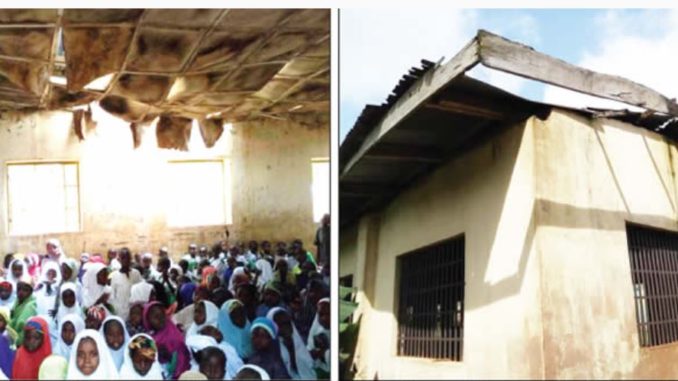
FOR failing to meet the due process requirements for accessing funds provided for rehabilitating basic schools by most state governments, the Universal Basic Education Commission has been sitting on an idle N84 billion meant for that purpose as of September 2018, the agency’s latest document indicates. This is a criminal negligence in governance, against the background of the fact that most schools are dilapidated, just as there are insufficient classrooms, while many rural communities across the country lack schools.
The idle amount was N47 billion between 2015 and 2017. The increase is suggestive of a likely perverse progression in the years ahead, if some drastic measures are not taken to reverse the order. According to this newspaper, a breakdown of the funds lying fallow are: N18.80 billion for 2015 and 2016; N29.58 billion for 2017, while N36.35 billion was for 2018.
Each state is supposed to provide counterpart funding and adhere to a template formulated for its judicious use to qualify for accessing its annual allocation. But between 2015 and 2016, the states of Ogun, Plateau, Kwara, Enugu, Abia and Bayelsa were in default, while Abia, Adamawa, Akwa Ibom, Anambra, Bauchi, Bayelsa, Benue, Ebonyi, Enugu, Edo, Ekiti, Imo, Kaduna, Kano, Katsina, Nasarawa, Niger, Ogun, Ondo, Sokoto, Plateau, Yobe and Zamfara also never collected the N29.58 billion meant for them in 2017.
Horrible pictures of public schools in decadent conditions appeared on the front page of this newspaper on June 17. All of them had rusted, half-torn zincs, caved-in ceilings, classrooms without doors and windows; these were schools in Lagos, Ogun, Enugu, Rivers and Osun states. In Rivers State, pupils of the Community Secondary School, Omagwa, in Ikwere, sat on bare floor to learn; yet, the state is rich in oil revenue. It is the same fate for pupils of one primary school in the Kurmi Local Government Area, Kaduna State, on which a Lagos-based television station carried a documentary recently. These absurdities are not in sync with the computer age. According to Nigeria’s educational system, primary class one to six and the first three years in secondary constitute the basic level of schooling.
Make no mistake about it, dilapidated schools or unsafe school environment contributes to the out-of-school children conundrum. In April, a federal inquest into the crisis revealed Kano, Akwa Ibom, Katsina, Kaduna, Taraba, Sokoto, Yobe, Zamfara, Oyo, Benue, Jigawa and Ebonyi states as the worst affected.
Experts have always said that the right environment must exist before learning can take place. But the objective realities in most state-owned schools do not promote this necessity; a reason UNESCO classified Nigeria among countries where teaching takes place, but without learning. This paradox should be vehemently tackled, given the fact that basic school is the touchstone or foundation for quality education – the superstructure every society needs for its development and survival.
Even before now, some governors who collected UBEC allocations either diverted or embezzled them. One such case involved a governor who left office in 2007 in the North. But political expediency, which has suddenly over-ridden public interest and cause of justice, has compelled an anti-graft agency handling the trial to get cold feet. Since the UBE programme, an interventionist initiative of the Federal Government to assist the states overcome basic school funding challenges, is now being sabotaged, it should devise new strategies to ensure their compliance in the overall interest of the country.
Education for All is a global development agenda, which must be sustained. This was why the then United Nations Secretary-General, Ban Ki-moon, while launching the initiative, “Education First,” in 2012, reminded leaders “to ensure that every child goes to school, receives quality education and imbibes values of global citizenship.” A former Prime Minister of the United Kingdom, Gordon Brown, a United Nations Special Envoy for Global Education, extended the concern further, stressing that it was imperative “…in view of the scale of wasted talent and potential worldwide.” This unfortunate pool of gifted but wasted children, because of their being deprived of quality basic education, should not be increasing in Nigeria.
Ironically, such is the case with the spike of the number of out-of-school children from 10.5 million to 13.2 million, the highest globally, according to UNICEF. This is a notorious distinction Nigeria’s leaders should be ashamed of. UNICEF said the North-East and the North-West states had female primary attendance ratio of 44 per cent and 47 per cent respectively, just as 69 per cent of the out-of-school children originates from the North.
For this horde of children without basic education, the future is certainly not assured. This is a social time-bomb for the immediate future with its multi-faceted corollaries – increased adult illiterate population, a band of frustrated youths who turn to criminality, kidnapping and robbery for livelihood.
States that toy with the utilisation of this fund should wake up. Besides, governors should think twice about this fad of building a few model basic schools at the city centres and allowing those in the rural areas to rot away. It does not give equal opportunity to all the pupils.
END

Be the first to comment